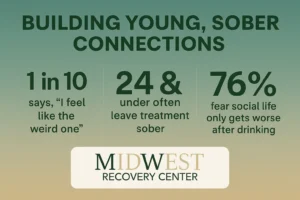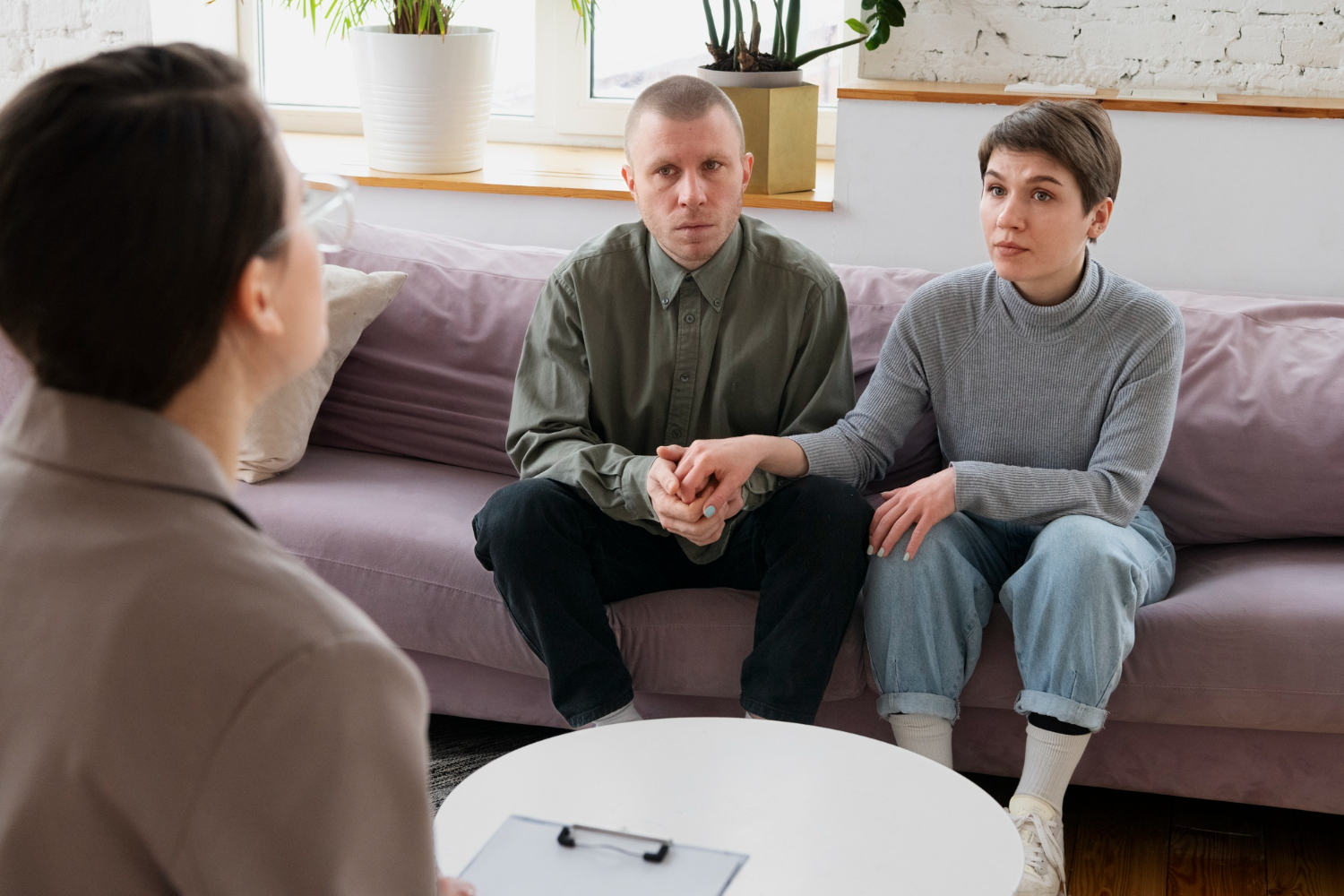If you’re young, sober, and feeling like you don’t belong anywhere—welcome. Not just to this blog, but to a conversation no one really has out loud.
Because here’s what most people don’t talk about: it’s incredibly disorienting to quit drinking when everyone your age seems to be just getting started. You might feel like the weird one. The too-serious one. The one who suddenly doesn’t get invited out—or who goes but spends the night pretending to hold a drink just to blend in.
The truth? You’re not the only one. And you’re not broken for wanting more than hangovers and awkward mornings.
At Midwest Recovery Center, we see young adults every day who are ready for change—but afraid of being alone in that choice. Our alcohol addiction treatment in Toledo, Ohio is designed not just to help you stop drinking, but to help you find real connection again. The kind that lasts longer than a night out.
Here’s how it works—and how treatment can help you build your people, one honest connection at a time.
1. You Realize You’re Not the Only One Doing This Young
It can feel like everyone around you is partying without consequences. But when you step into treatment, that illusion disappears fast.
You’ll meet people your age—people who also reached a point where drinking wasn’t fun anymore. People who saw the panic in the morning, the overthinking after blackouts, the creeping realization that alcohol was costing more than it gave.
And when you see that you’re not the only 22-year-old or 26-year-old or college dropout or working parent who chose sobriety early? That’s the moment you stop feeling like a mistake—and start feeling like someone making a brave choice.
2. Group Therapy Fast-Tracks Real Connection
There’s nothing wrong with small talk, but let’s be honest—it’s exhausting when you’re sober and everyone else is tipsy.
In group therapy, the masks come off fast. You get to say the things you’ve never said. The mistakes you’ve made. The fears you carry. The “I’m scared everyone will think I’m boring now” voice in your head.
And then you hear someone else say, “Same.” And suddenly, that shame loses its power.
Group work helps you bond over truth, not performance. Over time, these connections go deeper than most friendships built on weekend plans and Snap stories.
3. You Build Community That Doesn’t Rely on Drinking
Some of your old friendships might fade—not because you’re better than anyone, but because your priorities changed. That’s real, and that’s hard.
But here’s what you gain: new friendships based on emotional honesty, shared goals, and showing up when it matters.
In treatment, you learn what true support looks like. People who check in after a tough day. Friends who remember your birthday and bring cupcakes instead of shots. People who show up to celebrate your 90 days sober, even if they’re only on day 17.
It’s not about losing your people—it’s about finally finding your people.

4. You Learn to Handle the Social Weirdness (Because It Is Weird)
Let’s just say it—being sober at a party is weird at first. Everyone else is buzzing, and you’re calculating how long you have to stay before you can leave without looking rude.
Treatment doesn’t make that go away overnight—but it gives you tools. You’ll learn how to say “no” without overexplaining. How to recognize when a night out just isn’t for you. How to find fun again, even in spaces that used to revolve around alcohol.
And most importantly? You’ll figure out how to show up as yourself without needing to be anything else.
5. You Connect Over Struggle, Not Just Vibes
A lot of friendships in early adulthood are surface-level: who’s going out, who’s dating who, what’s funny online. That’s fine—until you go through something real.
When you’re in treatment, the friendships you form come from a deeper place. You meet people who’ve cried the same tears, made the same late-night decisions, carried the same shame. And that kind of shared struggle builds trust fast.
These are the people who don’t flinch when you talk about your lowest moment. Who know how to sit with you instead of fixing you. Who’ve earned the right to be in your corner—not because they knew the old you, but because they stood beside you while you built the new one.
6. You Reconnect With People Who Actually Matter
Treatment doesn’t just help you find new people—it can help you rebuild bridges with old ones.
That might mean calling your mom and having the first honest conversation in years. Texting a sibling you pushed away. Telling a friend, “Hey, I’ve been struggling—but I’m doing something about it now.”
Recovery gives you the clarity and confidence to show up in your relationships differently. To apologize when it’s needed. To set boundaries where they’re missing. To finally be the version of yourself that you were trying to be all along.
And if you’re looking for alcohol addiction treatment in Maumee, Ohio or Youngstown, Ohio, we’re close enough to support those reconnections with in-person or outpatient options that work with your life.
7. You Learn to Like (and Be) Yourself—Which Attracts Better People
This might sound small, but it’s huge: when you stop hiding, pretending, numbing, or apologizing for who you are—your vibe changes.
In treatment, you learn how to sit with discomfort. You learn how to name your needs. You laugh without second-guessing it. You build the kind of quiet confidence that doesn’t need a drink to be funny or interesting or chill.
And people notice.
The people who come into your life post-treatment? They’re usually people who are drawn to your clarity, not your chaos. People who want to know the real you—not the party version.
FAQs
What if I’m the youngest person in treatment?
You might be surprised—many people enter treatment in their 20s or even late teens. And even if you are the youngest, you’ll likely still find people who get your story. We make sure every client feels seen, supported, and understood, no matter their age.
Will my social life get worse without alcohol?
It might shift—but “worse” isn’t the right word. You might go out less, but you’ll likely find that the connections you do make are more real, and the events you say yes to are actually worth your time.
How do I make friends in recovery?
Through group therapy, alumni programs, outpatient sessions, and even casual check-ins—recovery spaces are full of people open to connection. You’ll also gain communication tools that make making new friends outside of treatment feel more natural.
Is it okay that I miss partying sometimes?
Absolutely. Missing the fun parts doesn’t mean you’re doing recovery wrong. It means you’re human. Treatment helps you grieve what you’re leaving behind while building something new in its place.
Can I do treatment and still go to school or work?
Yes. We offer flexible outpatient options designed to support people balancing school, jobs, or caregiving. You don’t have to put your whole life on pause to get help.
You Don’t Have to Do This Alone
If you’ve ever looked around a room and thought, “I don’t belong here anymore”—you’re not wrong. But that doesn’t mean you’re broken. It means you’re growing.
At Midwest Recovery Center, we’re here to help you find where you do belong—where honesty is normal, healing is possible, and being young and sober doesn’t make you weird… it makes you brave.
Call (888) 657‑0858 or visit our Alcohol Addiction Treatment Program in Toledo, Ohio to learn more.


























